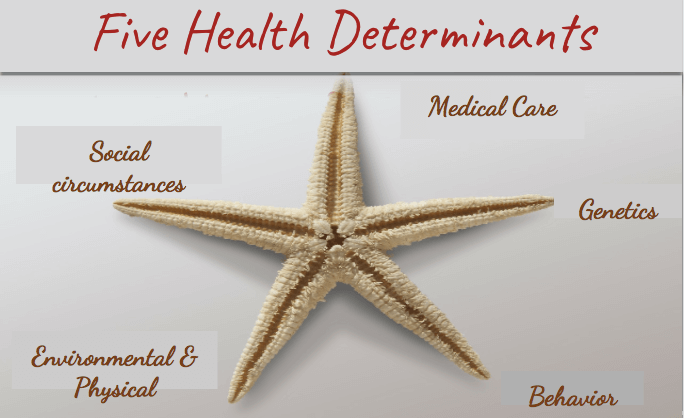Five Determinants of Health
The scientific community neatly categorizes various factors affecting our Health into 5 groups – The 5 determinants of health.
To improve something one has to learn how it works. And to learn how it works one has to take it apart, study the parts and then put them back together. Only then can one make meaningful suggestions to improve it.
My training as an engineer was looking for an anchor, a starting point. My ‘discovery’ of the 5 determinants gave me a starting point to learn more. To pry the health puzzle apart. And then take a step back to see what we could do to improve health outcomes.
This finding raised many questions. Questions like what ‘factors’ makes up these 5 determinants? Which of these factors can be ‘influenced’ in order to improve our health – individually and collectively? How? Influencing which ones will have a larger impact on health – give us a better ROI? Are we doing anything today to influence these factors? What are we doing?
I decided to take a deeper dive. Let me start with the first question. What are these 5 Determinants? What makes up these 5 determinants of health – Genetics, Behavior, Social Circumstances, Environmental and Physical influences, and Medical Care?
At a seventy thousand foot level, there are definitions provided by CDC defines and at healthypeople.gov. Some of these details throw up interesting possibilities
Genetics (and Biology)

More than anything else, our health is defined by who we are, male or female, our age, any predispositions wired in our genetic code, things like that.
This seems pretty obvious. The ‘Nature’ part of nature vs. nurture.
An example of effects of biology on our health is in the decline in our physical and cognitive abilities as we age; and of genetics is how some people that trace their ancestry to tropical areas of Central and South America, Africa and Middle East, South Asia are genetically predisposed to Sickle cell disease. Genetic predispositions have also been documented for conditions like hemophilia, cystic fibrosis, breast and ovarian cancer; family history of cardiac disease.
Our health is determined by what we are made up of. So let us look at the second question I posed earlier in this blog. Can we influence this determinant to improve our health? I don’t think so… not yet anyway, though there are some strides being made in the area of genetic therapies.
Individual behavior

That brings us to the second determinant – Individual behavior. The ‘Nurture’ part of Nature vs. Nurture.To look at another way, while biology and genetics provide a ‘starting point’ for our health, we can bend our ‘health vector’ by the lifestyle choices that we make. What we eat, whether we exercise, do we get enough sleep, use alcohol, drugs, sugar, smoking are some things that come to mind.
Can we do something on this front to improve our health? Absolutely. I can speak from personal experience.
I ran my health down in early adulthood by making poor health choices – alcohol, smoking, irregular hours, and poor dietary choices. Fortunately a chance conversation triggered a course correction. That prompted me to change my behavior and started my journey back to a healthy lifestyle, or as my wife jokes – to sainthood. I have stuck with the ‘program’ for over a decade and I feel healthier and fitter than ever before.
This is not difficult. The simplest things hold promise of best results. Simple things like eating well, sleeping, exercising moderately, washing our hands.
I would recommend ‘All I really need to know I learnt in Kindergarten’ by Robert Fulghum. Its very easy to read. And full of wisdom.
Social circumstances
As the name suggests, the third determinant – social circumstances capture the social aspects of our lives.
The opportunities that we have education and jobs; who we interact with, how well, any discrimination that we face; whether we have social support, do we feel like we belong; level of safety in the community are some aspects of social circumstances that effect our health.
These factors define our quality of life, and therefore the levels of stress that we face which has a significant impact on our health.
Asking the question again – can we impact factors on this determinant? Yes.
Environmental factors

Environmental determinants of health are those that have to do with things like where we live; where we spend our time – at work and play.
What are these places like? How clean? Hygenic? Quality of Air? Noise pollution levels? Quality of construction? Access to nature? Weather?
Research studies document how poor environmental conditions affect health adversely affected. For example high stress levels for people living in noisy environments, higher incidence of asthma in areas with poor air quality, of cancer in communities close to sites with high concentration of toxic materials.
Can we impact environmental factors to improve outcomes on health? I think we would all say yes.
Health services
This is the obvious one. The kind of access that we have to health delivery systems determines how healthy we are when things go wrong, how well we recover, and how fast?
Access to healthcare delivery systems can be impacted by availability of facilities, cost of access.
What does this mean?
This last determinant, access to quality healthcare delivery systems is where we spend most of our time, energy and treasure on.
However as we have seen, there are at least three other determinants that have a significant impact on our health – Individual behavior, Social aspects, and Environmental conditions.
Let me quote from “Health Policy Brief, Robert World Johnson Foundation – Aug 21, 2014” (and a related article in Health Affairs)
One theme gaining strength in the research literature posits that many benefits from the extremely high health care spending in the United States are undermined by the nation’s very low investments in social services, broadly defined to include support services for older adults, survivor benefits, disability and sickness benefits, family supports, housing programs, employment programs, unemployment benefits, and other social policy issues
The question is how can we bend the curve on these three? How can we systematically, methodically, deliberately effect sustained positive change on these determinants to improve our health?





